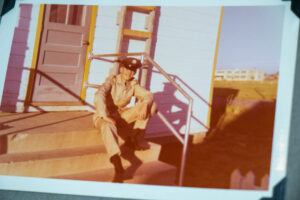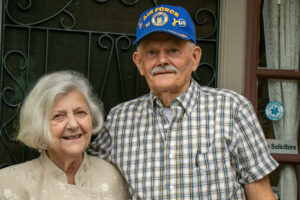By DEVIN PAYNE, CULPEPER STAR-EXPONENT
 Elton Edquest recalls his days in the Air Force so vividly that you’d think his discharge only happened yesterday.
Elton Edquest recalls his days in the Air Force so vividly that you’d think his discharge only happened yesterday.
Barely two years out of high school in Bridgeport, Connecticut, Edquest and a close friend each found themselves searching for direction.
The year was 1958.
“My friend Rich and I had talked about what we were going to do with our lives while we were still in [high school],” Edquest said during a phone interview in late October. “Once we were out of school and got to talking about it again, I told him, ‘I’m going into the Navy.’ He said, ‘Well I’m going into the Air Force.'”
A conundrum was born.
“Next thing I knew, I was standing there, and there was a Navy office at one end of the street and an Air Force one at the other end,” Edquest recalled. “I went back and forth on what I was going to do for a bit.”
When Edquest met up with Rich a short time later, he asked his friend if he’d signed up for the Air Force as promised.
“Yep,” Rich said to Edquest’s inquiry. “What about you? Did you sign up for the Navy?”
Edquest initially replied with a wry “yep,” but he couldn’t contain himself for long.
“Nah, I decided to go into the Air Force,” he said with a chuckle.
The happy-go-lucky Edquest, who goes by “Eddie” to his family and friends, was about to begin a four-year journey that would take him across the U.S. and over the Atlantic Ocean to France.
An 11-week basic training regimen took Eddie to Texas first, then Colorado. While there, he had to select a course of study.
After careful consideration, Eddie selected electronics, which was a relatively new field in the Air Force at that time. This led to the first valuable life lesson he’d learn during his service time.
“Me and the other guys would come to class, and the instructors wouldn’t be there,” he said. “I asked one of them, “Where’s the teacher?” and we figured out that they were all in the other room drinking cups of coffee.”
Eddie’s instructors hadn’t forgotten about he and his mates, however.
“At the end of the week, they’d come and take our textbooks and give us a test,” he said with a laugh. “We didn’t know what was going on, so we all failed. And we kept failing, week after week.
“None of us had taken the initiative to crack those books open and teach ourselves any of the material,” he added. “And so you sit there and realize that, if you’re ever going to get anywhere in this world, then you’ve got to take the lead in your own life.”
Not all of Eddie’s fellow recruits had the epiphany he did though. In fact, many simply ended up becoming cooks.
Eddie had no problem with anyone wanting to ply their trade in the culinary arts, but he wanted no part of that field.
“I could barely make a pot of coffee,” he joked, “so I had no interest whatsoever in becoming a cook.”
Cook or not, Eddie still needed something to set his sights on. Then, after spinning his wheels for a bit, he got a lifeline from one of his superior officers.
“He said, ‘Why don’t you try law enforcement and security?'” Eddie recalled. “That hadn’t crossed my mind before, but I thought ‘Why not?'”
His new area of focus quickly led to Eddie becoming an officer in the Air Police (now Security Forces), which is the Air Force’s law enforcement wing.
“I really grew to like it,” he said of his time in the Air Police. “It gave me a purpose and took me a lot of different places, including back to the East Coast and across the pond.”
After being stationed in Nebraska and then Rome, N.Y., Eddie was sent to France in 1960. By then, he’d already decided that he wanted to remain in the Air Force beyond the end of his commitment in 1962.
As it turned out, fate had other plans.
“It got down to where I had six months left to go before being discharged, and I contacted the guy in charge of that sort of thing and told him I wanted to re-up my commitment,” he remembered. “He told me that he’d get back to me soon and we’d get it taken care of, but it just kept getting delayed.”
By the time 1962 rolled around and Eddie’s service time was up, he’d flipped his decision and was preparing for a return home to Connecticut and civilian life.
“It’s funny, because right before I was discharged, they finally came to me and asked if I wanted to stay in the [Air Force],” he said. “By then, I was like, “Nope, I’m going home.'”
Eddie’s decision to go home would have a profound effect on the rest of his life. Had he not returned to Connecticut when he did, he likely wouldn’t have met Arlene, his future wife.
“I was bowling in Westport, Connecticut, and [Eddie] kept coming over and sitting behind me, trying to strike up conversation,” said Arlene, a New Jersey native. “It was getting annoying.
“Finally, he just asked me out,” she continued. “I said, ‘okay, sure.'”
 Arlene’s annoyance with Eddie gradually dissipated, and they eventually married in 1967. They went on to have a son, David, and a daughter, Jenny.
Arlene’s annoyance with Eddie gradually dissipated, and they eventually married in 1967. They went on to have a son, David, and a daughter, Jenny.
Eddie spent the better part of the four decades following his military discharge working for Hamilton Beach/Proctor-Silex, where he was a model maker. The company eventually parted ways with him during a series of layoffs in 2000, and he was all set to transition into retirement at the age of 62.
“I was working on some projects at home and Arlene asked me if I wanted a sandwich and something to drink,” he said. “I told her ‘sure,’ and she brought them to me. A little while later, she came back and asked if I was going to eat and drink them. When I replied to her, nothing but gibberish came out. I couldn’t string two words together to save my life.”
As Eddie and Arlene were living in Richmond, Virginia at the time, he was rushed to McGuire VA Medical Center.
“We didn’t know if he’d had a stroke or what,” Arlene recalled. “He was in very bad shape though.”
According to the doctors at McGuire, Eddie hadn’t suffered a stroke. Nonetheless, he remained unable to speak, and many of his basic motor functions were also affected.
“I was practically reduced to the state of a newborn baby,” Eddie said. “I had to re-learn how to talk, walk, eat, you name it.”
Though he eventually recovered, Eddie thinks he’s pinned down the culprit for his health scare.
“I spent all those years painting models at Hamilton Beach/Proctor-Silex,” he said. “Back then, the chemicals in that stuff weren’t as safe as they are today. We’d paint the models, and then they’d sit in front of a big fan that was designed to help them dry.
“All the fumes coming off those models and blowing through that building all day long, they had to have an adverse affect on anyone who was around them,” he concluded.
Now 82, Eddie and Arlene, 77, relocated to Culpeper eight years ago to be closer to their five grandchildren. Jenny, who lives in Madison County, has two daughters and a son, while David has two daughters of his own.
“We needed to be near them, so the move made perfect sense for us,” Arlene said. “You never know how much time you’re going to get with your loved ones, so you have to take advantage of every opportunity that you get to be with them.”
While neither Eddie or Arlene drive automobiles anymore, they’ve been fortunate to have the help of Hero’s Bridge, a Warrenton-based organization that is dedicated to serving elderly veterans aged 65 and older.
Through the entity’s Battle Buddy Program, Brandon and Amanda Miller have grown to know Eddie quite well.
“Whenever you’re around [Eddie], you’d better be prepared for some laughs and a good time,” Amanda said. “He’s just an absolute joy.”
Added Brandon: “Eddie is simply a kind soul worth knowing.”
Aimee O’Grady, the community outreach coordinator for Hero’s Bridge, said she’s most struck by how proud Eddie is of his time serving his country.
“He wears his military hat daily,” said O’Grady, referring to the blue Air Force baseball cap adorned with a handful of pins that seldom leaves Eddie’s head.
While Eddie wears that cap like a badge of honor on a daily basis, his time in the Air Force isn’t what he holds most dear in this life—one he treasures each and every day.
“If I hadn’t left the [Air Force] when I did, I never would’ve met Arlene,” he said, his voice cracking with emotion. “And I don’t know where I’d be, or if I’d still be here at all, without her. Her love, and the love of two children and five grandchildren, means the world to me.”
540/848-4530
